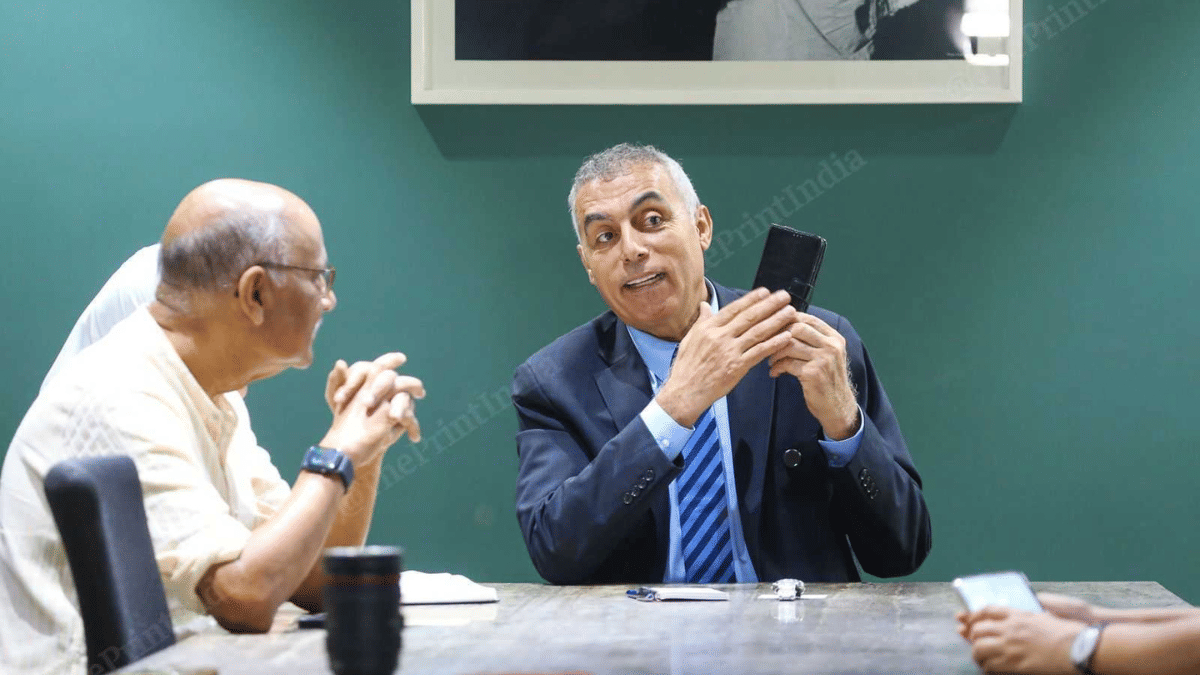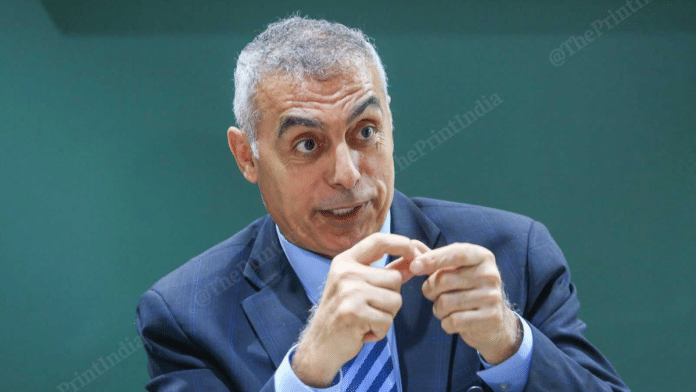New Delhi: Hamas was “created by Israel” but Palestinians will not accept anyone designating it as a terrorist organisation, Palestinian Ambassador to India Abdullah Abu Shawesh asserted in a wide-ranging interaction with The Print.
The envoy also distanced the Palestinian Authority from the 7 October attacks by Hamas to which Israel responded with military action that has been ongoing for over a year and a half. “We are not in agreement with Hamas on 7 October. President (Mahmoud) Abbas was clear—hostages should be released,” he said.
Though he said Hamas was “an essential part of the Palestinian people,” he drew a sharp distinction with the Palestine Liberation Organisation (PLO). Hamas, Shawesh reminded, had “expelled us from Gaza in 2007”.
Tracing the origins of Hamas, the ambassador accused Israel, with alleged encouragement from the British, of facilitating the rise of the Islamist movement in the late 1980s to undermine the PLO, which had by then gained international recognition as the sole legitimate representative of the Palestinian people.
“After the Arab League and India recognised the PLO in 1974, Israel chose not to sit at the negotiating table. Instead, it created al-Mujamma al-Islamiya, the original Hamas, under Sheikh Ahmed Yassin. They destroyed the Palestinian Authority’s security apparatus and allowed Hamas to fill the vacuum,” he told ThePrint.
At the same time, he made it clear that Palestine will not designate Hamas as a terror organisation, adding that India too doesn’t designate it as a terror outfit.
“Hamas is an essential part of the Palestinian people. But Hamas doesn’t represent the Palestinian people. As the Palestinian Fatah movement, led by Yasser Arafat, we believe resisting occupation—including through armed struggle—is a right under international law. Therefore, we reject any attempt to designate Hamas as a terrorist group,” he said.
In the interaction, replete with historical references, the envoy sought to offer a deeply personal, unfiltered counter-narrative to mainstream accounts of the Israel-Hamas conflict, particularly in the wake of the 7 October terror attacks.
PLO vs Hamas
Shawesh stressed that the PLO, led by Abbas, supports peaceful resistance and diplomacy, in contrast to Hamas’s more militant stance. However, he was equally firm that whether Hamas is a terrorist or a revolutionary organisation is debatable. But Hamas, he maintained, remains “a central part” to the Palestinian people.
With Hamas currently excluded from contesting Palestinian elections, the ambassador explained that this was because “it has not accepted the political obligations of the PLO”.
“Anyone who wants to participate in our political life must accept the PLO’s obligations. That includes recognition of the Oslo Accords and our right to build a state on just 22 percent of our historical land,” he explained.

“Why does history begin on 7 October? No one talks about the 400 Palestinians killed before that day in 2023 alone, or the thousands languishing in Israeli prisons,” Shawesh said, referring to the narratives post the 2023 conflict.
He called for an international inquiry into the events of 7 October, before and after. “We want the truth. Who supported Hamas? Who facilitated 7 October? Let’s investigate it all.”
Drawing parallels with India’s colonial past, he said, the Palestinians are facing the same circumstances. “In 1857, India faced the exact same situation that we are facing today. Thousands of your ancestors were slaughtered because they started a military resistance. History is there, and we, the Palestinians, copy you.”
The ambassador highlighted India’s early support for the Palestinian cause, especially its 1947 vote against the UN partition plan.
“India was the first after the Arab League to recognise the PLO in 1974. But today, the Israeli ambassador is on your TV screens daily. We are not even given a chance to speak,” he said. Adding, “We are the victims of occupation and unfortunately, we are even denied the right to tell our story.”
‘No comparison between 7 Oct & Pahalgam’
The Palestinian ambassador also asserted that there should be no comparison between the October 7 attack by Hamas and the Pahalgam terror attack, calling such comparisons not on India’s “side at all.”
“No one should compare what happened two months ago with what happened on 7 October at all. Your army is not an occupation army. You are not an occupier. You have your own border. This happened according to your government, at least,” Shawesh said.
“You are not occupying. You are not targeting the people because they are Muslim, or because they are Hindus, or your army targeting them because they are X or Y of faith. We used to be targeted because we are Gazans, we are Palestinians.”
Shawesh was clear that while India did deliver a measured response to Pakistan, there were “no massacres” committed by the Indian armed forces. The Palestinian ambassador further highlighted that the Indian military is not blacklisted by the United Nations for failing to protect children.
In comparison, the Israel Defence Forces (IDF) was in June added to a list of ‘offenders failing to protect children’. The stark differences between the IDF and the Indian military make any comparison between the events of April and May in South Asia an “unfair comparison” for Indian society as a whole, the Palestinian envoy said.
At least 60,000 people have been killed in the Gaza strip since Israel began its retaliation for the 7 October attacks. Large parts of Gaza have been destroyed in over 650 days of consistent bombardment by Israel.
In a conversation with ThePrint last month, Israel Ambassador Reuven Azar sought to cast Tel Aviv’s action in Gaza in a similar vein to New Delhi’s Operation Sindoor. India’s retaliation to Pahalgam targeted terrorist complexes and infrastructure across Pakistan, including Jaish-e-Mohammad’s Bahawalpur and Lashkar-e-Taiba’s Muridke facilities.
Azar had highlighted that the events of 7 October that left nearly 1,100 Israelis dead and a further 250 taken hostage was roughly 10,000 times in intensity to the Pahalgam terrorist attack, when comparing the populations of India and Israel.
On his part, the Palestinian envoy sought to explain the situation in Gaza using a similar yardstick. “Can I use this scale? We are talking about 7 percent of the Gazans who were killed and injured. God forbid, compare it to the 1.5 billion Indians. How many million? 95 percent of the Gazan people are totally living in man-made shelters, as displaced persons.”
“This means that, because I’m using the same exact scale to measure, to compare, this means that approximately 1.3 billion, if not more, of the Indians have lost their homes.”
(Edited by Tony Rai)
Also Read: 4 of Five Eyes & 24 other nations condemn Israel’s actions in Gaza, call for it to stop






